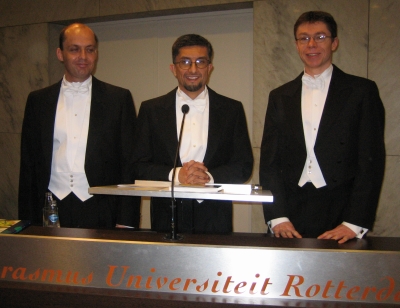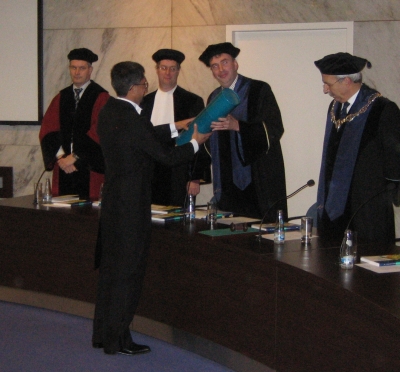Guillermo Baquero obtains PhD Degree
 Guillermo Baquero has defended his PhD thesis entitled “On Hedge Fund Performance, Capital Flows and Investor Psychology” on December 7.
Guillermo Baquero has defended his PhD thesis entitled “On Hedge Fund Performance, Capital Flows and Investor Psychology” on December 7.
Guillermo Baquero (Quito, 1967) holds a degree in mechanical engineering (Quito, 1992) and has a professional experience of several years in the field of hydraulic and pneumatic automation. Later he obtained an MBA and an MSc in Economics from the Katholieke Universiteit Leuven, in Belgium. Between 1999 and 2001 he worked as a research associate at the Centre for Economic Studies (CES) of the KU Leuven. In September 2001 he joined the Financial Management Department of the Rotterdam School of Management and the ERIM PhD program.
Guillermo’s teaching experience includes a number of courses in Corporate Finance, Investments and Behavioural Finance, both at the bachelor and master level, and courses in Industrial Engineering at the executive level. He has worked as a consultant for several firms and organizations in Belgium and Ecuador in matters related to Finance and Development. He is also a guest lecturer at the Latin-American Faculty of Social Sciences (FLACSO) in Quito, Ecuador.
 Abstract
Abstract
In a relatively short period of time, hedge funds have become major players in the financial markets. In 2004, the estimated total reached nearly 8000 funds, and the assets under management had risen to $1 trillion, from nearly $100 billion in 1994. The client base for hedge funds has expanded beyond foundations and endowments to company pensions, public pensions, and to less “sophisticated” investors. However, the increasing and widespread acceptance of hedge funds as an alternative investment vehicle is disconcerting if we consider their limited transparency and the restricted liquidity conditions imposed to investors. On these grounds, serious questions arise about investors’ ability to make the right investment choices in hedge funds. This book speaks to these concerns. The four essays presented here examine the investment process of investors, the underlying factors determining their choices and the implications for investors’ wealth and for hedge funds’ performance. Four main conclusions follow. First, that hedge fund managers exhibit, on average, persistence in their performance at quarterly horizons, justifying to some extent an active search for skilled managers; however, large informational asymmetries prevent investors from taking timely decisions and exploiting the persistence of good performing funds while incurring high opportunity costs. In contrast, investors are able to divest swiftly from the poor performers, which may have a moderating effect on the risk-taking incentives of managers. Finally, investors appear to misread the information available and overreact to persistence patterns, both at the individual fund level and at the style level. Overall, this study confirms a potentially suboptimal allocation of capital flows across hedge funds, calling for higher levels of transparency in the demand side for capital, and more cautious due diligence and increased prudence in the supply side.
More Information
Full text of the Dissertation
Pictures of the Defense


